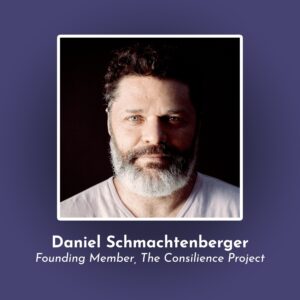
Show Summary
In this episode, Nate welcomes back Daniel Schmachtenberger to unpack a new paper, which he co-authored, entitled Development in Progress, an analysis on the history of progress and the consequences of ‘advancement’.
Current mainstream narratives sell the story that progress is synonymous with betterment, and that the world becomes better for everyone as GDP and economies continue to grow. Yet, this is an incomplete portrayal that leaves out the dark sides of advancement. What are the implications when only the victors of history write the narratives of progress and define societal values? What are the value systems embedded in our institutions and policies, and how do they reinforce the need for ongoing growth at the expense of the natural world and human well-being? Finally, how do we change these dynamics to form a new, holistic definition of progress that accounts for the connectedness of our planet to the health of our minds, bodies, and communities?
The full paper discussed in this episode will be available on The Consilience Project website in the near future.
About Daniel Schmachtenberger
Daniel Schmachtenberger is a founding member of The Consilience Project, aimed at improving public sensemaking and dialogue.
The throughline of his interests has to do with ways of improving the health and development of individuals and society, with a virtuous relationship between the two as a goal.
Towards these ends, he’s had a particular interest in catastrophic and existential risk, with focuses on civilization collapse and institutional decay. His work also includes an analysis of progress narratives, collective action problems, and social organization theories. These themes are all connected through close study of the relevant domains in philosophy and science.
In French, we have a motto that says that a simple drawing is often better than a long explanation. Jean-Marc Jancovici Carbone 4 President
That’s very understandable because with left atmosphere thinking, one of the problems is that you see everything as a series of problems that must have solutions. Iain McGilchrist Neuroscientist and Philosopher
We can’t have hundreds and hundreds of real relationships that are healthy because that requires time and effort and full attention and awareness of being in real relationship and conversation with the other human. Nate Hagens Director of ISEOF
This is the crux of the whole problem. Individual parts of nature are more valuable than the biocomplexity of nature. Thomas Crowther Founder Restor
Show Notes & Links to Learn More
Download transcriptConsilience Project paper on ‘Development in Progress’
00:00 – Daniel Schmachtenberger info + Bend Not Break series + Episode on Artificial Intelligence
08:08 – Screen time associated with depression in teens
09:02 – Supply chain of an iPhone
09:15 – Silent Spring, Rachel Carson
09:15 – Leaded gasoline, DDT
10:12 – War, disease, and addiction are good for GDP
12:28 – Hobbes State of Nature
14:25 – Carbon pulse
16:10 – Ghengis Khan killed *40 million people – 11% of the global population at the time, and 10% of the old Mongol territory estimated to be his descendents
16:52 – Attila the Hun, Alexander the Great, Ivan the Terrible, Julius Caesar
17:23 – Beginning of civilization
18:01 – High infant mortality, but actual average age in ancient history
18:22 – Dunbar numbers
21:13 – Iroquois confederacy, designs of constraints
21:38 – Pacific NW tribes embedded rules of constraint (fishing)
21:40 – Jevons Paradox
22:16 – Sabbath
22:59 – Potlatch
24:01 – Maximum Power Principle
27:56 – Fast food and convenience food are highly addicting with way less micronutrients
28:28 – First climate change paper written in 1938, UNEP
28:54 – There is a trillion U.S. dollars of climate finance per year
30:20 – Adding non-carbon energy sources are not reducing fossil energy use
32:01 – Manifest Destiny
34:50 – Multipolar trap
41:10 – Humans and neanderthals
43:55 – Co-evolution, predator and prey
45:52 – Symmetry of power in competition
49:06 – Decline of oxygen in the atmosphere and the oceans
53:01 – 3M PFAS remediation settlement of 10.3 billion dollars
53:17 – PFAS is everywhere and affecting the health of everything, and doesn’t breakdown
53:51 – One state budget for PFAS remediation was estimated to cost 50 million dollars
54:45 – Companies knew PFAS were toxic, as well as leaded gasoline
58:28 – Dark Triad
59:24 – Narcissism, Sociopathy, Machiavelliansim
1:00:27 – 14th amendment, loophole to give personhood rights to corporations,
1:03:05 – Shareholder value
1:05:24 – Jaron Lanier
1:07:28 – Red Teaming
1:11:04 – Jeremy Grantham, TGS Episode
1:13:25 – Increase in rates of cancer, mapped over rates of carcinogenic chemicals in the atmosphere
1:14:43 – Haber Bosch
1:15:13 – Carcinogens in breast milk
1:22:35 – Kissinger and Buffet
1:23:54 – Gaussian Distribution
1:25:22 – Top 8 wealthiest people have as much money as bottom 4 billion
1:28:50 – Shareholder value and the supreme court
1:30:02 – Nate’s Frankly on Dark Triad
1:31:22 – Jainism
1:35:42 – Nuremberg Trials, how many Nazis believed what they were doing was good
1:37:14 – Asch conformity studies, Milgram Studies, smoke door study
1:50:46 – 50 million people enslaved
1:44:54 – Creative Destruction
1:44:56 – The Art of Maintenance
1:47:41 – ACEs
1:47:58 – Response to trauma is very variable
1:58:23 – Descartes
2:01:40 – Many cultures didn’t divide the objective and the subjective
2:02:28 – Von Neumann on Game Theory
2:04:56 – Iain Mcghilchrist, TGS Episode, Master and his Emissary
2:06:33 – Clockwork Orange
2:07:30 – War is a Racket
2:15:15 – Animal plows and incompatibility with animism
2:22:10 – How to mislead with facts
2:23:35 – Population growth, energy per capita growth
2:25:44 – Human population/species extinctions, Ocean dead zones, micronutrient deficiency
2:27:32 – Most plagues are zoonotic
2:28:35 – Weston A. Price, grains and cavities
2:32:40 – Food and Drug industries
2:35:15 – Permaculture approach to agriculture
2;45:23 – Vanessa Andreotti + TGS
2:46:25 – Bohm, Einstein, Krishnamurti
2:48:21 – English is 70% nouns
2:57:36 – Erich Fromm
3:01:59 – Moore’s Law, AI






